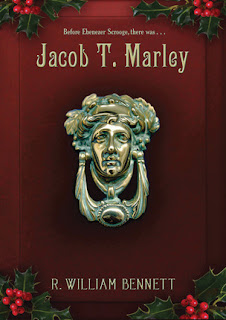Book Review: Jacob T. Marley
 Jacob T. Marley
Jacob T. MarleyR. William Bennett, 2011
After my first attempt at reading a Christmas-Carol-adjacent novel led me to a pile of trash masquerading as a book, I just hoped this one would be better. And it was, at least at first.
The first half or so of this book was actually pretty good. It creates a plausible backstory for Marley and his relationship with Scrooge that works with the original, while expanding aspects of it. It occasionally flirts with stylish prose without trying too hard.
This Scrooge and Marley choose to act greedily within the letter of the law (unlike the mess in the other book), showing that the law is not enough when you don't care about anything but wealth and your own advancement - capitalism without human kindness leads only to exploitation, loneliness, and misery. So far, so good.
And if it had ended, as the other book did, with Marley's death, I could give it a cautious recommendation: not a great book or anything brilliant, but a nice little piece of derivative (i.e., fan) fiction.
But it doesn't stop there.
Instead the book proceeds to recap all of A Christmas Carol except with additional unnecessary commentary. And it doesn't even use its extra (downright excessive) length to explore the parts of the original that are often glossed over or rushed through. It even misses some things that make it into many film adaptations.
Because here is where this one goes completely off the rails - it adds in a bunch of explicit and complex rules around the ghosts and penance and forgiveness. The worst part is, Marley is told that he can enter Heaven because of a deathbed repentance, but instead he chooses to suffer for a chance to help Scrooge. Whether or not we like this choice as a character beat, portraying morality with these rules undercuts the original story.
The first half or so of this book was actually pretty good. It creates a plausible backstory for Marley and his relationship with Scrooge that works with the original, while expanding aspects of it. It occasionally flirts with stylish prose without trying too hard.
This Scrooge and Marley choose to act greedily within the letter of the law (unlike the mess in the other book), showing that the law is not enough when you don't care about anything but wealth and your own advancement - capitalism without human kindness leads only to exploitation, loneliness, and misery. So far, so good.
And if it had ended, as the other book did, with Marley's death, I could give it a cautious recommendation: not a great book or anything brilliant, but a nice little piece of derivative (i.e., fan) fiction.
But it doesn't stop there.
Instead the book proceeds to recap all of A Christmas Carol except with additional unnecessary commentary. And it doesn't even use its extra (downright excessive) length to explore the parts of the original that are often glossed over or rushed through. It even misses some things that make it into many film adaptations.
Because here is where this one goes completely off the rails - it adds in a bunch of explicit and complex rules around the ghosts and penance and forgiveness. The worst part is, Marley is told that he can enter Heaven because of a deathbed repentance, but instead he chooses to suffer for a chance to help Scrooge. Whether or not we like this choice as a character beat, portraying morality with these rules undercuts the original story.
If Marley's deeds in life don't actually seal his fate (reminder: wandering the earth as a ghost wrapped in chains, cursed to see people in need and be unable to help them), Scrooge doesn't need to actually change his ways to avoid that same fate. If either of them can just say sorry at any point and all is forgiven by the spirits, then by that logic, why should Scrooge change and decide to do good things for other people?
A Christmas Carol isn't about thinking good thoughts, it's about doing good deeds that affect others. If you don't make that the center of your book, you've fundamentally misunderstood.
Parts of this were kind of good, but it ends up being mostly disappointing.
A Christmas Carol isn't about thinking good thoughts, it's about doing good deeds that affect others. If you don't make that the center of your book, you've fundamentally misunderstood.
Parts of this were kind of good, but it ends up being mostly disappointing.

Comments
Post a Comment